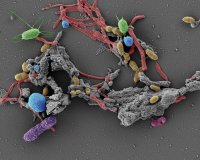
A microbiome is a highly complex community of microorganisms that live together in a specific area, in the narrower sense in and on living organisms or plants. This community consists of a large number of different microorganisms, i.e. microscopically small bacteria, archaea, fungi, other single-celled organisms and viruses...









